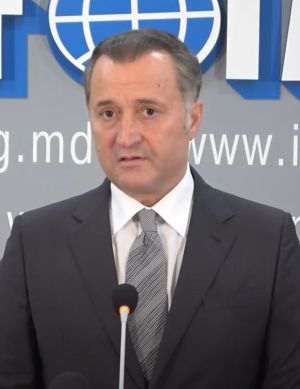Reporter: What effect do you expect the listing on the London Stock Exchange will have on the liquidity of the BSE?
Greg Konieczny: I would first of all like to say that there have been other secondary listings, and we have to take into account the fact that the stock market doesn't mean just the liquidity of the BSE, but a lot more.
The BSE is just one of the players on the market and it wouldn't exist without the issuers and the investors.
It is very important for the decisions of the shareholders to be complied with. Our shareholders are the biggest investors on the domestic market, and they have expressed their will when it comes to the secondary listing. If someone isn't pleased with that decision, they should present their arguments, and say why it's a bad thing for the market.
We have explained why we support this listing and having been the managers of the Proprietatea Fund for four years now, we have demonstrated that we strongly support the domestic stock market, which is not the same thing as the liquidity of the Bucharest Stock Exchange.
In the end, we think that the dual listing will also help the domestic stock market. But the most important thing is for the listing to bring about better ratings for the Fund and the companies in its portfolio. We are hoping that a lot more investors attracted through this listing will expand to the Romanian stock market.
I am not frustrated, but I have demonstrated that what we have done has been beneficial for the market and I think that this move will be a step in the same direction.
Reporter: You still have to get past the "hurdle" of the ASF.
Greg Konieczny: From the regulator's perspective, I don't think that the listing in London brings any risk to the stability of the market, and the ASF admits that. It is just about creating a new set of rules, which would ensure smooth settlements and the technical requirements for executing the listing. We are not talking about inventing the wheel, but rather about adopting regulations that exist in other countries.
Reporter: Do you have concerns about the regulator, considering that it's because of it that you failed to get listed in Warsaw?
Greg Konieczny: Back then we were dealing with the CNVM. There have been many changes, the ASF has a new president that is market-oriented and has a lot of experience. We have very different relations compared to what came before.
Reporter: You are saying that the relations with Mişu Negriţoiu are good.
Greg Konieczny: Yes, both with him and the team of Mr. Mircea Ursache, which helped us and has been very understanding with the issues concerning the Proprietatea Fund.
Reporter: With some of them.
Greg Konieczny: You can't expect it to be like that with all of them. There are, after all, some regulations and laws that have to be changed. That is why we have begun with removing the eight barriers to the development of the stock market.
But this is only the first step towards making the market more friendly for issuers and investors, but many other measures must follow.
Reporter: What do you think are your chances of meeting the requirements of the shareholders to keep the discount between the price of the shares and the NAVPS below 15%, for at least two thirds of the October 1st, 2014 - - June 30, 2015 period?
Greg Konieczny: We are determined to create value for our shareholders, including by reducing the discount. 15% is just a number (ed. note: at the end of July, the discount was 33%, as the NAVPS was 1.2489 lei/share). Maybe some time from now, people will say it's not ambitious enough. I hope that will be the case. But to achieve that, we should be allowed to take all the possible measures. One of those measures is precisely the listing in London.
Reporter: If I understand correctly, you are confident that you will meet the requirements, but not necessarily within the specified time frame.
Greg Konieczny: I am only saying that we will work on that and that 15% is just a number. It could have been 16%, 17%.
Reporter: But you are dependent on that number.
Greg Konieczny: Yes, we are dependent on it. The shareholders will evaluate what we've done and will make a decision. Unfortunately, it is outside of our control, but we will do everything in our power to significantly reduce the discount. Whether it will be 15%, 20% or 10%, I don't know.
Reporter: What other measures are you considering, aside from the listing in London?
Greg Konieczny: We will continue what we have already begun. On one hand, we will adjust the portfolio and we will try to increase the NAVPS. Of course, we will attempt to lower as much as possible the weight the unlisted shares have in our portfolios, because that is one of the reasons why the discount is so high. There are also the corporate actions - the distributions to shareholders, the buybacks that are already approved and other things which we will announce when we are ready.
Reporter: What assets do you want to sell in the coming period?
Greg Konieczny: We have already announced that we want to sell or to create liquidity for the distribution companies - EON, Enel, GDF. It is hard to think that they could get listed. Perhaps one idea would be to trade them with something else, instead of selling them. We will see.
Reporter: You have tried to propose the listing of Salrom as well.
Greg Konieczny: That is a different issue. We think that aside from the offers already approved by the Government, there are three candidates for an IPO: Salrom, the Port of Constanţa and Aeroporturi Bucureşti. We are trying to work with the government for them to be included in their agenda. We are hoping that at least one of those would come to the market next year, because right now we have nothing on our schedule, and the market needs liquidity to grow.
Reporter: There have been protests concerning the Port of Constanţa and then the Minister of Transports was replaced. Did you have any talks with the new minister?
Greg Konieczny: Yes. We are working with the Government. Even prime-minister Victor Ponta spoke a few times about the listing of the Port of Constanţa. It is the decision of the Government, not ours.
Reporter: How would you describe the results you've had so far, after the actions taken to lower the discount?
Greg Konieczny: We have fulfilled that goal. The discount is shrinking from one year to the next, but it is still unacceptably high. That is why we want to use all the generated money to lower the discount rather than for potential investments.
Reporter: You've said that the Proprietatea Fund is too big compared to the size of our stock market. What size would be ideal?
Greg Konieczny: Considering the current size of the market? That is a good question. It is hard to say. Let's put it this way. We invest through other Franklin Templeton funds. Considering the size and the fact that we are not allowed to buy shares in the Proprietatea Fund, we have about 200 million Euros invested in Romania, using other funds. That is the kind of money that an investor that doesn't buy the Proprietatea Fund can quickly bring into the market. With that kind of money, aside from the Proprietatea Fund, we are probably the biggest investor in the market.
Reporter: The Franklin Templeton funds have exited the SIFs. Does that mean you are not pleased with the decision of the ASF to allow the SIFs to buy shares in each other?
Greg Konieczny: I think we sold our shares earlier than that. The managers of the SIFs should be asked what their strategies are. The FT funds have invested in the SIFs, in the context of the new elections, because we thought that there was a chance of "fresh blood" in the system. Unfortunately, that wasn't the case. We are seeing very few interest from the current managers of the SIFs to create value to the shareholders.
Reporter: The Franklin Templeton funds have also massively sold BSE stock.
Greg Konieczny: I am not in charge of that, that's what the colleagues from the funds targeted at frontier markets do. It is their decision. A problem for them may have been the low capitalization of the BSE, the low liquidity, as the value of the funds has increased a lot. They have thought it is better to invest in something else. In many countries they have decided to reduce the number of small holdings. We believe in the BSE because the market should expand, and the market operator should profit.
Reporter: Are you pleased with the activity of the management of the BSE?
Greg Konieczny: There are some tangible results. But, of course, it takes more work. The commissions of the BSE and of the ASF have to be lowered.
Reporter: Did you support the nomination of Ludwik Sobolewski on the Board of the Romanian Post Office?
Greg Konieczny: The nomination of Ludwik Sobolewski came from the Government. We have kept the member we already had over there. We think that his board of the Romanian Post Office, even though it hasn't been appointed in full compliance with Ordinance 109 (concerning private management), represents a very good change, in terms of the quality of the people that have been appointed. Their number one priority is to complete the privatization process. If they succeed, it will be a great achievement.
Reporter: A rather controversial move was the private placement you made in 5% of Romgaz, during the Electrica IPO. There are voices saying that you were worried about the effects of a possible failure of the IPO?
Greg Konieczny: The same people are saying that we sold Romgaz to prevent the listing of Electrica. It makes no sense.
Many people don't understand or have little experience when it comes to the stock market. Why would we be against the Electrica IPO? Why would we try to stop it?
The Electrica IPO was going to bring new investors into the market, that would show interest in other issuers as well and, moreover, it would raise a lot of money, which would have allowed the company to perhaps buy or stakes in its branches. It was in our interest, so we wouldn't have done anything to prevent this IPO.
On the contrary, through the Romgaz placement, I think that all we did was attract even more interest to Romania, because later, when we sold Transelectrica, from mid-June to mid-July, it was the best month in the history of the Romanian stock market.
Reporter: You've made many positive statements abut the management of Transelectrica and yet you have sold your stake in the company.
Greg Konieczny: We need to take into account the fact that at Transelectrica, as well as at Transgaz, because of the licensing as independent operators, we have lost our voting rights (ed. note: a European Directive states that you can't be a shareholder in a company that transports energy and in companies that produce and supply energy simultaneously). We were no longer able to influence what was happening with the company. That was the main reason why we sold the stake in Transelectrica. The performance of Transelectrica shares has even surprised us, at how quickly the stock bonuses were reflected in the operations of the company and have been acknowledged by the market. All of the shareholders of Transelectrica have benefited from that, they have received dividends, and the price is far higher. Still, without the voting rights, it was very hard for us to justify holding our stake in that company. Not many people realize that we lost our voting rights, but it is right there in the documents.



















































